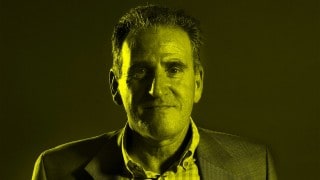The April 16 massacre on the campus of Virginia Tech by a lone gunman has become another bloodstained entry in the ever-expanding ledger of mass murders, here and aPoad. Headlines about slaughters in schools, post offices, and other public places blend in with daily news reports of terrorist assaults worldwide on civilians, reports so frequent and ghastly that eventually, unavoidably, they leave us numb.
The actions of those who would blow themselves up in order to annihilate scores of ordinary citizens—who would kidnap, torture, and behead reporters—who would icily, indiscriminately shoot dozens of men, women, and children in schools or fast-food restaurants—are unfathomable to the civilized mind. So, we try to project ourselves into the skulls of the butchers and imagine what could possibly motivate such barbarity.
We know that we would never voluntarily to do such horrific things. We therefore think the killer must have been “driven” to commit his atrocities, by unbearable pressures, or by intolerable cruelties from others, or by sheer madness. On this assumption, we postulate various “causes” that might “explain” the otherwise inexplicable. This is the language of what I call “the Excuse-Making Industry,” a major spin-off of university humanities departments. Their catalogue of “driving forces” is limited only by their creativity, because of a simple fact: nobody’s life is perfect. Post hoc, we can always find some flaw in a monster’s life, a hook upon which we then try to hang his gory deeds.
So, after the bloodbath, we root around through the scrapbooks and closets of the killer, searching for the blemish in his life that, we assume, was motivationally decisive. Maybe poverty “made” him do it. (As the juvenile delinquent mockingly tells Officer Krupke in The West Side Story, “We’re depraved on accounta we’re deprived.”) Or, if he was from a wealthy home, maybe too much pampering and spoiling “made” him do it. Maybe drugs or alcohol or internet porn “made him crazy.” Maybe his girlfriend jilted him. Maybe somebody insulted or teased or abused him. Maybe his professor failed him. Maybe somebody stole the land of his ancestors—or enslaved them. Maybe it was a “reaction” to U.S. imperialism or Israeli repression or institutionalized racism or IMF lending policies in the Third World. Maybe there was a cyst on his Pain or unnatural preservatives in his junk food or rap lyrics on his iPod. Hell, maybe the devil made him do it. Clearly, though, something must have “compelled” him to such an “act of desperation.”
But this very assumption implies determinism—that the murderer was moved by forces beyond his rational control, forces that propelled him, like a helpless billiard ball, to strike others. These explanations that we contrive, often from the flimsiest reeds of circumstance, invariably remove moral responsibility from the culprit. And so he, too, becomes a “victim”: someone who is “sick,” not bad, someone who needs “treatment” or “rehabilitation,” not punishment.
In the end, though, our “explanations” explain nothing, because millions enduring precisely the same circumstances—and worse—did not choose to shoot, stab, or blow up anybody. Moreover, as we look closer, we find that the great majority of these killers are not out-of-control psychotics who “couldn’t help it.” To the contrary, most of them fantasized, planned, even rehearsed their acts, often for months or years, and took great pains to avoid prior detection and capture. At any time, they could have (and often have) called off or altered their plans, especially if they calculated a high risk of being caught. So, they are in control and they do know what they’re doing.
But to say that their actions are not “caused,” in the deterministic sense, does not mean that they are unmotivated. People have reasons for what they do, and mass killers have reasons to do what, for most of us, is unthinkable.
So, why do they choose to do it? Are the motives of political terrorists, suicide bombers, and criminal mass murderers idiosyncratic to the individual? Are they different by category? Or are there motivational elements common to mass killers of all sorts? Abundant research on these questions exists, and I’ve looked at a lot of it, and spoken to many experts, while doing investigative journalism on crime.
Motivationally, I think it’s useful to segregate mass murderers into two categories: individuals and groups. The mindsets of people acting alone, or perhaps with a partner, tend to differ from those acting in groups. Individual mass murderers tend to kill for personal reasons; groups tend to kill for ideological ones. For descriptive simplicity, let’s call these mass murderers and ideological terrorists, respectively. (...)
Stopping the Slaughter
Understanding the intellectual processes and social dynamics by which humans change into monsters provides insights as to what we might do to stop many mass slayings before they occur. As I’ve noted, two necessary precursors to any killing spree are a rationale and rehearsal. Let’s consider each in turn.
Rationale. The world will always have its losers. Not everyone will be able to successfully navigate life’s shoals, and self-esteem is a trait we are only beginning to learn how to nurture.
But it is one thing for a depressed, suicidal loser to blame and turn on himself; it is quite another for him to blame and turn on the rest of society for the “injustices” committed against him—injustices that “deprived” him of his “rights” to happiness, love, land, and wealth.
It should be easy to see how the reigning egalitarian philosophies of our time promote toxic feelings of victimization, entitlement, and envy.
It should be equally easy to see how the excuse-makers in the humanities departments, who propagate every kind of deterministic “explanation” for crime, have effectively insulated criminals from all responsibility for their deeds, becoming their professional “enablers” (to use the buzzword).
It should be just as easy to see how extolling the “heroism” of self-sacrifice to a collective or ideological cause only feeds the motivational cycle of terroristic violence.
If one seeks a true “cause” for the rapid spread of mass murder and terrorism in the world, look no farther. These popular ideas our have poisoned the cultural soil from which now sprout the nihilistic revenge fantasies of killers such as Charles Manson, “Unabomber” Ted Kaczynski, or John Muhammad; just read their “manifestos.” They also provide ideological justifications for attacks on us by terrorist enemies aPoad, such as bin Laden and Zawahiri; read their manifestos, too.
Most people want to do “the right thing.” If we allow morality to be inverted so that the massacre of innocents becomes “the right thing,” is it any wonder why now see everywhere the incredible spectacle of righteous slaughter?
Promoting, as key moral values, reason, personal responsibility, and the sovereignty of individual life will go a long way toward marginalizing violence in society. It will deprive potential killers of a necessary precondition to their acts: a motivational rationale.
Rehearsal. No one commits, on the spur of the moment, unthinkable atrocities. In fact, that is a contradiction in terms: those who commit atrocities first think about them. They rehearse them in their minds. They obsess about them, losing themselves in a world of bloody fantasies. Fantasizing helps establish the unthinkable as the normal.
Violence has been a central element of literature and art since Homer, and no one should call for its censorship from popular culture. But the normalization of particularly graphic, sadistic violence in popular culture—through films, video games, and music lyrics—has unquestionably helped to fuel the fantasy lives of angry, troubled individuals. We don’t have to patronize those who produce such psychological poison or be kind to them. Nor do parents have to allow it in their homes, where it can infect their children.
Adolescence is often a time of frustration, poor self-image, and uncertainty over personal identity. Parents and teachers, in particular, should be watchful for signs in their kids of extreme social alienation and morbid attraction to violent fantasy, and be prepared to intervene.
The old saw that “an idle mind is the devil’s playground” is, metaphorically, quite true. Nothing better fills this vacuum than a productive purpose. Adults should try to guide their children toward creative and fulfilling pursuits. Happy, active kids are not the stuff of which mass murderers are made.
The normalization of what has been called “righteous slaughter” in our world—and the excuse-making that encourages it—constitutes perhaps the greatest challenge to our civilization. Philosophies that promote irrationalism and “Groupthink,” egalitarianism and envy, determinism and personal irresponsibility, self-sacrifice and collectivism, have only fueled the fantasies of today’s blood Pothers: the hate-filled nihilists and the angry fanatics. They are charting the course of millions toward annihilation.
The only alternative is to choose a new philosophical chart that will put us on a new heading—toward reason and self-responsibility.
http://atlassociety.org/ct-1925-Blood_Brothers.aspx









